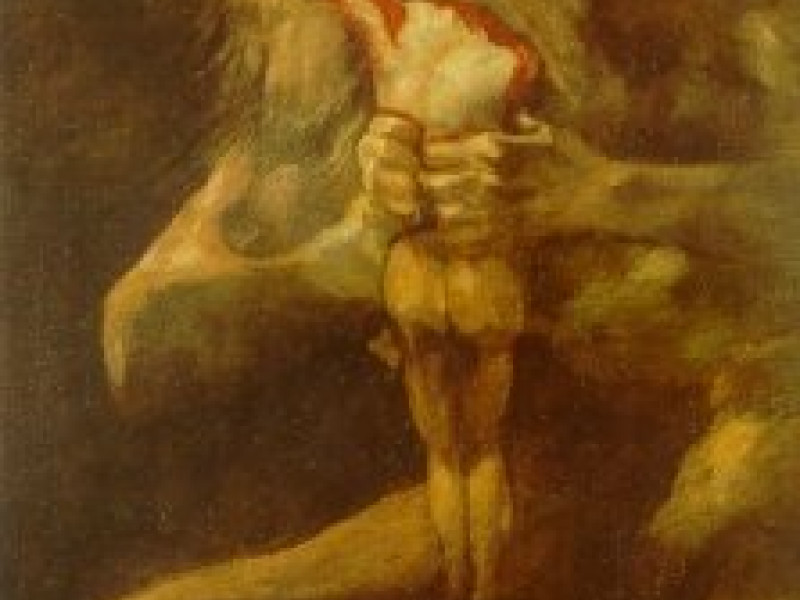Eurynome and Ophion
Apollonius Rhodius described a creation myth that was very different from that of Hesiod's Theogony. Apollonius' account is very short and rather sketchy.
Apollonius began the myth as one of the songs sang by Orpheus (Ὀρφεύς) after the departure of the Argonauts from Iolcus. Orpheus was the mythical bard who had joined Jason and the Argonauts in the Quest.
Orpheus sang a song about how the world was originally cast in one single mould; the earth, sky and sea was all mixed up in this mould until the mould was tore asunder from some internal turmoil within the Cosmic Egg. All of a sudden the earth, sea and heaven were separated; mountains rose from the sea, while the sun and moon and stars followed their path through the sky (something like the Big Bang).
Two of the earliest beings came into existence during the creation of the world. One was named Eurynome (Εὐρυνόμη), daughter of the Ocean (Oceanus), while her consort was named Ophion (Ὀφίων). Together they ruled the entire universe from Olympus.
But one day, the Titans Cronus (Κρόνος) and Rhea (Ῥεία) violently displaced Ophion and Eurynome from Olympus. They flung Ophion and Eurynome into the Ocean (as opposed to being confined in Tartarus, like in Hesiod's Theogony).
While Cronus and Rhea ruled the world and the Titans, Zeus (Ζεύς) was living in the Dictaean cave (in Crete) as an infant, long before he received the mighty thunderbolt from the Cyclopes.
The account ended here.
Apollonius did not give much detail at all. I had some difficulties in finding out if Apollonius got this from another source or did he invent this little account by himself. It was discovered that the myth about Eurynome, as the creator-goddess, was said to be much older than the Theogony which was written by Hesiod in the 7th century BC.
Apollonius only mentioned Zeus as an infant in a cave in Crete, as well as mentioning that one day he would wield the thunderbolt, forged by the Cyclopes, like in Hesiod's account. However, Apollonius didn't complete his song told by Orpheus, where like in Hesiod's myth, Zeus displaced the Titans.
A more detailed account was found on Eurynome and Ophion that was quite different from Apollonius' allusion on the creation. This is said to be the myth of the original race or inhabitants in Greece, who were known as the Pelasgians.
(Before I end here, I would like to say that I have taken part of this article out, concerning the so-called Pelasgian Creation Myth which is different from that of Apollonius' account. This myth was recreated by Robert Graves, a famous contemporary mythographer and author of a number of books including The White Goddess (I haven't read this), and The Greek Myths, which is where I got the PCM (Pelasgian Creation Myth) from. He was the only person I know who wrote this version of Eurynome and the Cosmic Egg.
Although PCM was very interesting, I am rather dubious of Mr Graves' account, which he has said he reconstructed from various sources. What I am doubtful of is his reconstruction, which was more of his own personal elaboration and invention than genuine myths from the Pelasgians. Until I can find more authentic sources that resemble Graves' account, I am afraid that the Pelasgian Creation Myth will no longer be posted here. I am sorry if I caused any inconvenience.)
Related Information
Name
Eurynome, Εὐρυνόμη – "wide-wandering".
Ophion, Ὀφίων – "snake" or "serpent".
Sources
Argonautica was written by Apollonius of Rhodes.
Theogony and Works and Days were written by Hesiod.
By Jimmy Joe

